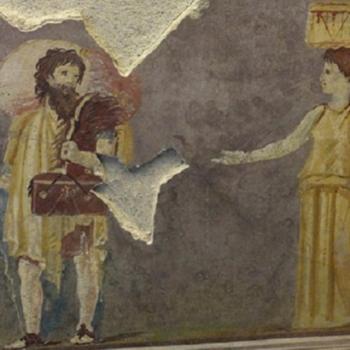America has gone back to the days when the Roman Republic first went out the window.
When the 2012 election did not go my way, I did not throw the hissy fit that some have been throwing for the past 18 months. I did not riot. However, I did wrestle with three possibilities of how to view the results of 2012:
- The God of truth and justice is a myth.
- God hates America, and has a miserable plan for the rest of our life.
- God has turned back the clock to the first century AD, in order to wean us away from the comforts of freedom and justice, and to re-set our priorities.
I’ll pick the third option.

Now I can understand Brutus’ sad last words: “O wretched Virtue! Is that the way it is? While you were just a name, I served you as something real, while you were just a servant of Fortune!” (Dio Cassius, Roman History 47)
Forget the freedom thing. The empire is the way to get things done. Jesus does not command the overthrow of the empire. He wastes not one penny on seeking political freedom. Nor do the apostles. They’ve got Good News that far outshines the evils of tyranny and economic exploitation. And it is far from a fairy tale concocted to placate the masses.
The picture of Rome and of Rome’s leaders in the first hundred years of the church looks strikingly contemporary. We get the comic version in Juvenal’s Satires, and the sober historian’s version in Suetonius’ biographies of the Caesars.
While the early church is busy converting Paul, we have Caligula, who promptly wastes 27 million gold pieces (1,194,690 ounces – you do the math) in his first year in office on his own enjoyment. (Suetonius, Gaius 37) He’s the guy who dissolved $40,000 pearls in vinegar and drank them. He boasted that “one must be either frugal or Caesar.” Nero, likewise, believed that “fortunes were made to be squandered,” and when he appointed magistrates, he told them, “You know my needs! Let us see to it that no one is left with anything.” (Suetonius, Nero 32)
Roman sexual morality was far from Puritan. Nero not merely endorses gay marriage, he practiced it himself with two different men (Suetonius, Nero 28-29). When Nero’s successor, the army general Galba, heard the news from an old army buddy that Nero was dead and that the door was open for him to become Caesar, Galba “openly showered him with kisses and begged him to get ready and have intercourse with him without delay” (Suetonius, Galba 21). Juvenal and Martial (who may be exaggerating, as comedians do) both give the impression that more than one third of the sex happening in Rome at this time was homosexual. And virtually the whole pagan world regarded the Christian restriction of sex to heterosexual marriage as being hopelessly unrealistic.
The point is that the earliest Christians did not live in a world that positively reinforced Christian ethics. Far from it! Both their culture and their leaders make even our most debauched government leaders look virtuous by comparison. Rome’s leaders were out of control and accountable to no one, far worse than anything we have seen in our nation.
To be sure, Paul declares in Romans 13:3-4 that government’s job is to reward good and punish evil. Yet Paul lived under a regime where lies, injustice, and outright violence by the state against its people reigned supreme and uncontested. What was he thinking? Jesus’ teaching to turn the other cheek was and is proved wrong every day, that is, unless you couple it with his guarantee that no good deed will go unpunished (from an earthbound perspective).
Brutus lamented the death of a free republic, and the death of his belief that virtue rewards those who seek her. We all need to willingly submit to that death, in order to be truly free to serve our risen Lord without ulterior motives.
Satan charged that Job served God because God shielded him from all harm (Job 1:9-11). No doubt a similar conversation has taken place with God about the sincerity of the American church. Will she continue to follow Jesus when the moral props of a free Christianized republic are knocked out from under us, where hatred and lies appear to reign supreme and accountable to no one? (We can debate about whose lies and hatred currently reign supreme, but the point is still valid either way.)
It does not matter how we view our elected leaders. Even dictatorship is no excuse (Romans 13:1-7, 1 Peter 2:13-17). For Christians, it does not matter whether Ahab, Josiah, Athaliah, Caligula, or Nero is in the seat of power. We are called, not to cave in to the ruling culture (as some in both political parties would advise us to do), but to be counter-cultural, to embody and exemplify a better way to live, and ultimately to point people to the risen Jesus.












